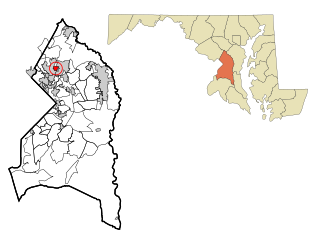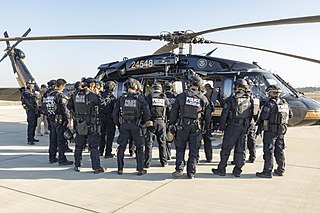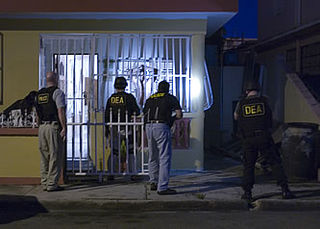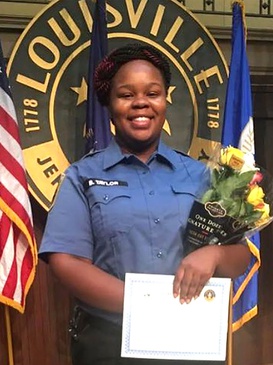Related Research Articles

Berwyn Heights is a town in Prince George's County, Maryland, United States. Per the 2020 census, the population was 3,345. It is bordered by College Park to the west, Greenbelt to the northeast, and Riverdale Park to the south.

District Heights is an incorporated municipality in Prince George's County, Maryland, United States, located near Maryland Route 4. Per the 2020 census, the population was 5,959. For more information, see the separate articles on Forestville and Suitland.

Forest Heights is a town in Prince George's County, Maryland, United States, and is part of the larger postal designation of Oxon Hill. The town straddles both sides of dual-lane Maryland Route 210 and includes two elementary schools. Per the 2020 census, the population was 2,658.

In the United States, a SWAT team is a police tactical unit that uses specialized or military equipment and tactics. Although they were first created in the 1960s to handle riot control or violent confrontations with criminals, the number and usage of SWAT teams increased in the 1980s and 1990s during the War on Drugs and later in the aftermath of the September 11 attacks. In the United States by 2005, SWAT teams were deployed 50,000 times every year, almost 80% of the time to serve search warrants, most often for narcotics. By 2015 that number had increased to nearly 80,000 times a year. SWAT teams are increasingly equipped with military-type hardware and trained to deploy against threats of terrorism, for crowd control, hostage taking, and in situations beyond the capabilities of ordinary law enforcement, sometimes deemed "high-risk".

Radley Prescott Balko is an American journalist, author, blogger, and speaker who writes about criminal justice, the drug war, and civil liberties. In 2022, he began publishing his work on Substack after being let go from The Washington Post, where he had worked as an opinion columnist for nine years. Balko has written several books, including The Rise of the Warrior Cop and The Cadaver King and the Country Dentist.

A police raid is an unexpected visit by police or other law enforcement officers with the aim of using the element of surprise to seize evidence or arrest suspects believed to be likely to hide evidence, resist arrest, endanger the public or officers if approached through other means, or simply be elsewhere at another time. Various tactics are used by law enforcement in raids that often vary based on available equipment, situational factors, laws, and police powers.
Donald P. Scott was a 61-year-old man who lived on a ranch in a remote part of Ventura County, California, in the Santa Monica Mountains, who was fatally shot during a police raid on October 2, 1992. The officers were attempting to serve a warrant to search his ranch for marijuana. When the officers forcibly entered his home, Scott emerged from his bedroom with a revolver because he heard his wife shouting "don't shoot me" and was then shot while lowering his gun as he was ordered to do by police. No marijuana plants or other evidence of drug sales were found on the property. An official inquiry later suggested that the agents hoped they could seize his property by use of asset forfeiture.

Kathryn Johnston was an elderly woman from Atlanta, Georgia who was killed by undercover police officers in her home on Neal Street in northwest Atlanta on November 21, 2006, where she had lived for 17 years. Three officers had entered her home in what was later described as a 'botched' drug raid. Officers cut off burglar bars and broke down her door using a no-knock warrant. Police said Johnston fired at them and they fired in response; she fired one shot out the door over the officers' heads and they fired 39 shots, five or six of which hit her. None of the officers were injured by her gunfire, but Johnston was killed by the officers. Police injuries were later attributed to friendly fire from each other's weapons.
In the United States, a no-knock warrant is a warrant issued by a judge that allows law enforcement to enter a property without immediate prior notification of the residents, such as by knocking or ringing a doorbell. In most cases, law enforcement will identify themselves just before they forcefully enter the property. It is issued under the belief that any evidence they hope to find may be destroyed between the time that police identify themselves and the time they secure the area, or in the event where there is a large perceived threat to officer safety during the execution of the warrant.

In the United States, a sheriff is an important official of a county charged primarily with judicial duties. In the United States, a sheriff is one of the chief administrative offices in the country. It is the sheriff's duty to take charge of prisoners, to oversee juries, and to prevent breaches of the peace. Sheriffs are usually elected, although some states have laws requiring certain qualifications of candidates. Elected sheriffs are accountable directly to the citizens of their county, the constitution of their state, and ultimately the United States Constitution.

Michael Angelo Jackson is a member of the Maryland Senate representing District 27 in Calvert, Charles and Prince George's counties. Jackson was a member of the Maryland House of Delegates representing District 27B in Calvert and Prince George's counties from January 2015 to January 2021. Jackson is also the former Sheriff of Prince George's County, Maryland.

The Prince George's County Police Department (PGPD) is the primary law enforcement agency in Prince George's County, Maryland in the United States, servicing a population of over 900,000 residents and visitors within 498 square miles (1,290 km2) of jurisdiction.

The Allegany County Sheriff's Office (ACSO) is the primary law enforcement agency for Allegany County, Maryland. The ACSO is a nationally accredited law enforcement agency servicing 430 square miles (1,100 km2) and a population of 75,300.

The Frederick County Sheriff's Office (FCSO) is the primary law enforcement agency serving a population of 222,938 residents within the 662.88 square miles (1,717 km2) area of Frederick County, Maryland.
The Chaldean mafia is a criminal organization composed of Chaldean Catholics that have operated narcotics distribution networks from Phoenix and San Diego to Detroit. Involved in violent crimes such as armed robbery, arson, assault, homicide, and kidnapping.
Ryan David Frederick, born 1979 or 1980 (age 43–44) is a former prisoner of the state of Virginia. He was convicted in 2009 of voluntary manslaughter for killing a police officer who was serving a search warrant. Frederick has said that he acted in self-defense and did not know that the person breaking into his house was a police officer. The case is notable for the magnitude of support the defendant received from his community, the press, and blogs, as well as for the relative leniency of the charge the jury chose for conviction in the death of an on-duty police officer. Frederick was reportedly released in 2016.

The Prince George's County Sheriff's Office (PGSO), officially the Office of the Sheriff, Prince George's County, provides law enforcement services in Prince George's County, Maryland in the United States. Its headquarters are located in Upper Marlboro, near the Depot Pond. The sheriff is the chief law enforcement officer of Prince George's County and is elected every four years. There are no term limits for the sheriff.

Jose Guerena was a U.S. Marine veteran who served in the Iraq War and who was killed in his Tucson, Arizona, home on May 5, 2011, by the Pima County Sheriff's Department SWAT team. Deputies were executing a warrant to search Guerena's home while investigating a case involving marijuana being smuggled into the U.S. from Mexico.

Operation Kruz Control was a twelve-month, multi-agency investigation of a drug trafficking organization in southern Arizona, between December 2012 and December 2013.

Breonna Taylor, a 26-year-old black woman, was fatally shot in her Louisville, Kentucky apartment on March 13, 2020, when at least seven police officers forced entry into the apartment as part of an investigation into drug dealing operations. Three Louisville Metro Police Department (LMPD) officers—Jonathan Mattingly, Brett Hankison, and Myles Cosgrove—were involved in the shooting. Taylor's boyfriend, Kenneth Walker, was inside the apartment with her when the plainclothes officers knocked on the door and then forced entry. The officers said that they announced themselves as police before forcing entry, but Walker said he did not hear any announcement, thought the officers were intruders, and fired a warning shot at them. The shot hit Mattingly in the leg, and the officers fired 32 shots in return. Walker was unhurt but Taylor, who was behind Walker, was hit by six bullets and died. During the incident, Hankison moved to the side of the apartment and shot 10 bullets through a covered window and glass door. According to police, Taylor's home was never searched.
References
- 1 2 Valentine, Daniel (August 5, 2010). "Prince George's county executive candidates defend their records". Maryland Gazette. Archived from the original on June 25, 2015. Retrieved August 5, 2010.
- ↑ "SWAT team raids Md. mayor's home, kills 2 dogs". USA Today . Gannett Company. July 31, 2008. Retrieved August 21, 2008.
- 1 2 "Editorials: Shoot First, Ask Later; In Prince George's, a drug bust goes awry". The Washington Post . August 7, 2008. p. A20. Retrieved August 21, 2008.
- ↑ Zongker, Brett (August 8, 2008). "Police clear name of Md. mayor after drug raid". The Seattle Times . Archived from the original on May 24, 2011. Retrieved August 21, 2008.
- ↑ Erickson, Amanda (August 11, 2008). "Mayor asks for Justice in drug raid". Chicago Tribune . Archived from the original on August 16, 2008. Retrieved August 21, 2008.
- ↑ "FBI investigates pet-killing police drug raid on mayor's home". The Australian . News Limited. August 9, 2008. Archived from the original on August 18, 2008. Retrieved August 21, 2008.
- ↑ Nasaw, Daniel (August 8, 2008). "Marijuana package leads US police to mistakenly raid mayor's home: During the ordeal, Mayor Cheye Calvo's two pet Labradors were killed by masked police officers". The Guardian . London. Retrieved August 21, 2008.
- 1 2 Davis, Aaron C. (July 31, 2008). "Police Raid Berwyn Heights Mayor's Home, Kill His 2 Dogs". The Washington Post. p. B01. Retrieved August 21, 2008.
- 1 2 Donovan, Doug (August 7, 2008). "Prince George's raid prompts call for probe: Berwyn Heights mayor denounces police tactics". The Baltimore Sun . Tribune Company. Archived from the original on September 4, 2019. Retrieved August 21, 2008.
- ↑ Valentine, Daniel (August 14, 2008). "NAACP: County losing trust in officials; Botched raid, inmate death cited". Maryland Gazette . Archived from the original on December 3, 2008. Retrieved August 21, 2008.
- ↑ Helderman, Rosalind S.; Davis, Aaron C. (August 8, 2008). "FBI to Review Raid That Killed Mayor's Dogs". The Washington Post. p. B01. Retrieved August 21, 2008.
- 1 2 3 4 Davis, Aaron C. (August 9, 2008). "Prince George's Police Clear Mayor, Family: Chief Offers No Apology for Drug Raid". The Washington Post. p. B01. Retrieved August 21, 2008.
- 1 2 3 Helderman, Rosalind S.; Davis, Aaron C. (September 5, 2008). "Killing of Mayor's 2 Dogs Justified, Pr. George's Finds". The Washington Post. p. B01. Retrieved January 6, 2009.
- ↑ Valentine, Daniel (December 11, 2008). "Mayor searches for answers months after raid on his home". Maryland Gazette. Archived from the original on December 16, 2008. Retrieved January 6, 2009.
- ↑ Helderman, Rosalind S.; Davis, Aaron C. (August 7, 2008). "Pr. George's Police Arrest 2 In Marijuana-Shipping Plot: One Package Went to Mayor's Wife". The Washington Post. p. A01. Retrieved August 21, 2008.
- ↑ Anderson, Curt. "House Bill 577, "No-Knock" Warrants". Maryland Legislative Information System. Archived from the original on October 6, 2006. Retrieved February 4, 2009.
- 1 2 Fisher, Marc (September 14, 2008). "No Police Work in This Botched Action". The Washington Post. p. C01. Retrieved January 6, 2009.
- ↑ "Mayor describes raid". CNN. August 8, 2008. Retrieved August 21, 2008.
- 1 2 Calvo, Cheye; Balko, Radley; Christ, Peter (November 2008). "Should No-Knock Police Raids Be Rare or Routine?". Cato Policy Report. Cato Institute. Archived from the original on November 26, 2013. Retrieved May 22, 2020.
- ↑ Firey, Thomas (August 2, 2008). "Another Police Raid; More Dead Dogs". Cato @ Liberty Official Blog. Cato Institute. Archived from the original on August 28, 2008. Retrieved January 6, 2009.
- 1 2 Castaneda, Ruben (January 25, 2011). "Prince George's settles suit by Berwyn Heights mayor over storming of home". The Washington Post.
- ↑ Davis, Aaron (June 20, 2009). "Sheriff Says Deputies 'Did Their Job'". The Washington Post.
- ↑ Valentine, Daniel (June 19, 2009). "Sheriff says deputies were justified in shooting mayor's dogs". Maryland Gazette. Archived from the original on June 23, 2009.
- ↑ Guadalupe, Patricia (June 19, 2009). "Report clears deputies in raid on mayor's home". WTOP. Archived from the original on June 11, 2011.
- ↑ Noble, Andrea (December 24, 2009). "Mayor will pursue lawsuit over raid". Maryland Gazette. Archived from the original on January 15, 2011.
- ↑ Wagner, Paul (January 24, 2011). "Prince George's County Settles Suit Over Raid of Berwyn Heights Mayor's Home". WTTG. Archived from the original on July 15, 2011.
- ↑ Brumfield, Sarah (January 25, 2011). "County Settling Suit Over Raid of Md. Mayor's Home". nbcwashington.com. NBC Washington. Retrieved March 30, 2022.
- ↑ Helderman, Rosalind S. (February 5, 2009). "Bill Calls for More Scrutiny Of SWAT Teams by Police". The Washington Post. Retrieved May 22, 2020.